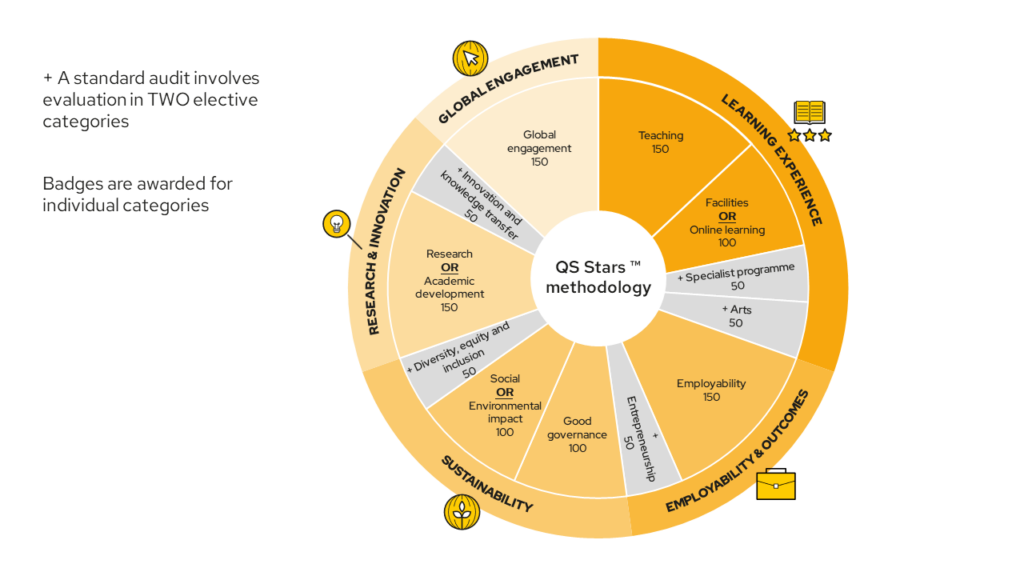
The methodology of the QS Stars university rating system is seeing one of its biggest shifts in its 15-year history. Since its launch in 2009, QS Stars has rated institutions out of a possible five stars based on areas that are most important to students.
To make sure QS Stars continues to be a useful tool for students, we are revising our methodology to reflect the changing priorities of students and embed feedback from higher education experts and data gathered during previous evaluations. QS Stars assessments will use the new methodology from January 2024.
The new methodology

Introducing sustainability as a factor
The most significant change to QS Stars’ methodology is the introduction of Sustainability as an assessment dimension. This means there are now five assessment dimensions:
- Sustainability
- Employability and Outcomes
- Learning Experience
- Research and Innovation
- Global Engagement
Accounting for more than 20% of a university’s total score, the Sustainability dimension includes three sub-categories essential to institutional sustainability, including Good Governance, Social or Environmental Impact and Diversity, Equity & Inclusion.
Students view sustainability as an increasingly important issue. According to QS’ global International Student Survey 41% of prospective students are now actively researching environmental sustainability. Less than a fifth said they were ‘extremely satisfied’ with the level of environmental action they’d seen from institutions they’d researched.
Reviewing our methodology beyond sustainability
While embedding sustainability as a dimension is the largest change, we have also evolved the existing dimensions.
Employability and Outcomes
For many students, a successful career is a primary goal of their university education. We have enhanced our evaluations to better reflect the ability of institutions to deliver high-quality employability skills. Institutions will be able to communicate their career-focused learning through indicators that look at employability outcomes, internships, corporate partnerships and other opportunities that equip students with in-demand practical skills to enhance their career prospects in the global marketplace. Entrepreneurship adds another dimension to this space, a category designed for the Graduate Management Education (GME) space to showcase the extent to which students are equipped for success in a rapidly evolving business world.
Learning Experience
Learning Experience keeps an emphasis on some of the other areas that are most important to students when choosing a university, namely Teaching and Learning Environment (either on campus or online). The addition of the Sustainability dimension means we have reduced the weighting of the Specialist Programme sub-category, and have made it an elective.
Global Engagement
Global Engagement, previously named Internationalisation, continues to highlight the importance of a globally connected institution by focusing on the number of international students and staff and nationalities represented in the student body, or the number and strength of international partnerships with other universities.
Research and Innovation
Finally, Research and Innovation evaluates the institution’s focus on pursuing innovation and ability to offer students opportunities for research and academic development. As in the previous version, we kept two different tracks for teaching-focused and research focused institutions. While Research assesses the extent of research commitment and impact of the institution, Academic Development offers a different lens focusing on the institutions’ efforts to invest into teaching quality.
“The largest methodological innovation in QS Stars”

Leigh Kamolins, Director of Analytics & Evaluation at QS, said: “This enhancement represents the largest methodological innovation in QS Stars since its inception, facilitating an ever more comprehensive analysis of the higher education environment in the contemporary context. With the QS Stars rating system, QS continues to capture and crystalise the collective intelligence of the higher education sector and respond to the changing priorities of students.”
He added: “The introduction of Sustainability and the refinement of other analytical lenses, such as Employability and Entrepreneurship, will hone the Stars rating system into an even more effective tool with which prospective students can make decisions about their future, knowing it has been crafted with their interests in mind.”
This announcement follows the launch of the QS World University Rankings: Sustainability 2024 on 5 December.
The full list of QS Stars rated institutions can be found here.



